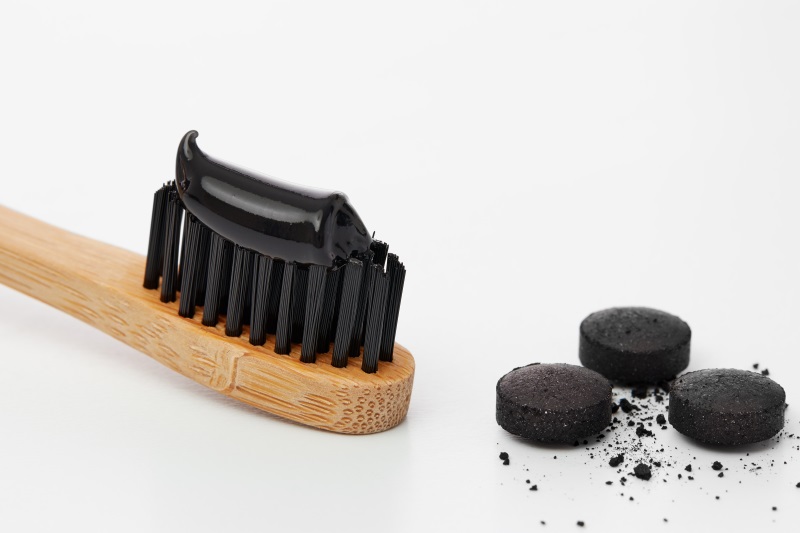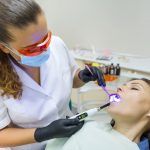Activated Charcoal Toothpastes: 101
When you think about charcoal, does you mind drift towards barbecues and grills?
Right?!
Most people don’t think about toothpaste or facemasks, that’s for sure. However, activated charcoal—not to be confused with the charcoal for this year’s Memorial Day cookout—is a manufactured substance that has been lauded for its absorbent qualities and ability to bind to molecules or atoms together.
Now, WHAT does that even mean?
While activated charcoal is catching on in health and beauty communities (particularly in magazines in the grocery store checkout line), are medical professionals endorsing this phenomenon, or are there concerns with this new fad?
Keep reading as we unpack what the heck activated charcoal beauty products are, how they work, their history and the clinical benefits of using it, specifically, on your teeth.
What is activated charcoal?
Activated charcoal is a fine black powder comprised of bone char, coconut, shells, peat, petroleum coke, coal, olive pits or sawdust. The charcoal is “activated” by processing it at very high temperatures. The high temperatures change its internal structure, reducing the size of its pores and increasing its surface area. This “activation” is what differentiates this type of charcoal from the type used on your barbecue grill, even if both are made from the same basic materials.
Activated charcoal is incredibly porous has a negative electrical charge, which causes it to attract positively charged molecules, such as toxins and gases.
Is activated charcoal new?
While some of the beauty uses may be new, using activated charcoal for other health reasons is not.
The first medical uses of activated charcoal were documented in the 1700s. Just like today, these medical providers noted its absorptive properties. About one hundred years later, it was then discovered to be an ideal antidote after ingesting something poisonous. In fact, patients in prisons were treated regularly with activated charcoal more than 150 years ago for this purpose.
Medical professionals today believe activated charcoal still may be the single most effective treatment for many types of poisoning. And while most people are more familiar with activated charcoal used in over-the-counter beauty products today that boast their own benefits, activated charcoal is still widely used in the medical community in the treatment of poisoning and overdoses.
Where is activated charcoal found?
In addition to oral health products like toothpaste (which we’ll discuss more later), activated charcoal has also been touted as a cure–all for acne, alleviating hangovers, and filtering water to ensure potability.
From clarifying facial masks to cleansing gels to health-boosting shampoos, the idea is always the same: activated charcoal has the ability to pull bacteria and other toxins and pesky particles out of wherever they’re inhabiting. With the charcoal’s porous surface, all those little nooks and crannies act like magnets for other particles, allowing all of those unwelcome substances to be swept away when the charcoal is washed off.
Activated charcoal and oral health
The teeth whitening industry is estimated to be worth more than $7.4 billion today. It’s no wonder that new and inventive products continue trying to make an entrance.
While many websites tout the benefits that activated charcoal can have on the teeth—it makes them whiter, shinier, more luminescent—the truth is that there is no formal evidence that it whitens teeth. While the FDA has approved the use of activated charcoal for some health applications, it has not for tooth whitening. Furthermore, the American Dental Association (ADA) has not yet approved any activated charcoal in dental products.
Concerns with activated charcoal and your teeth
Now, if it’s not specifically good for your teeth, is it bad for them?
The main concern using activated charcoal as an oral health product is that it may be too abrasive for your teeth. If used regularly, it could even damage enamel. Enamel is the hard, protective layer on the surface of your teeth that once is gone, doesn’t regenerate.
Another concern is that, since activated charcoal is so powerful at removing all things it comes in contact with, it could actually absorb beneficial bacteria and even medications from your blood stream.
Now, from a professional’s point of view, is it really detrimental to your health? Probably not. However, it probably won’t make your teeth whiter, either.
What activated charcoal CAN (potentially) do for your teeth
All that said, activated charcoal may have some benefits for removing surface stains. These are the stains that result from coffee, tobacco or other dark colored food (hello, red wine). These stains can be removed with a variety of over the counter products, including the toothpaste you have in your drawer. If you suffer from stains that are deep in the teeth (that have resulted from trauma or wear enamel), there is no amount of tooth whitening that can resolve these dark spots, since whitening only impacts the surface of the tooth.
If you choose to use activated charcoal on your teeth, just be sure to consider its abrasiveness. The Relative Dentin Abrasivity (RDA) is a guide to measure abrasiveness for all FDA approved dental products, and the FDA recommends a score of 200 or below. Look for products that score between a 70-90 on that scale. Another tip is to smear the product on your teeth instead of using a toothbrush. This limits the abrasive motions of the bristles and helps to protect your enamel.
If you do want to experiment with activated charcoal, it’s important to discuss it with your dentist first to ensure your teeth are strong enough for it.
Other natural tooth whitening options
Many people turn to activated charcoal as a natural way to whiten your teeth. But because there isn’t a compelling case to use activated charcoal to this end, for those who are interested in other natural options for a brighter smile, you can try:
- Baking soda: Baking soda has natural whitening agents in it which makes it a popular component of many commercial toothpastes. Its mildly abrasive nature helps to scrub away stains on the surface of your teeth. Some studies have found that toothpastes containing baking soda were significantly more effective at removing yellow stains from teeth than standard toothpastes without baking soda. And the higher the concentration of baking soda, the greater the effect.
- Hydrogen peroxide: Many toothpastes contain hydrogen peroxide as a component to kill bacteria and whiten teeth. It’s important to note, though, that heavily diluted concentrations appear safe; however, strong concentrations or overuse can cause gum irritation and tooth sensitivity.
- Apple cider vinegar: Acetic acid, which is the main active ingredient in apple cider vinegar, effectively kills bacteria. The antibacterial property of vinegar is what makes it useful for cleaning your mouth and whitening your teeth.
As with anything in dental health, it’s important to remember that it’s always best to practice moderation. If you are looking to whiten your smile, give our office a call so we can discuss your options and ensure your teeth are strong enough for any treatment!






